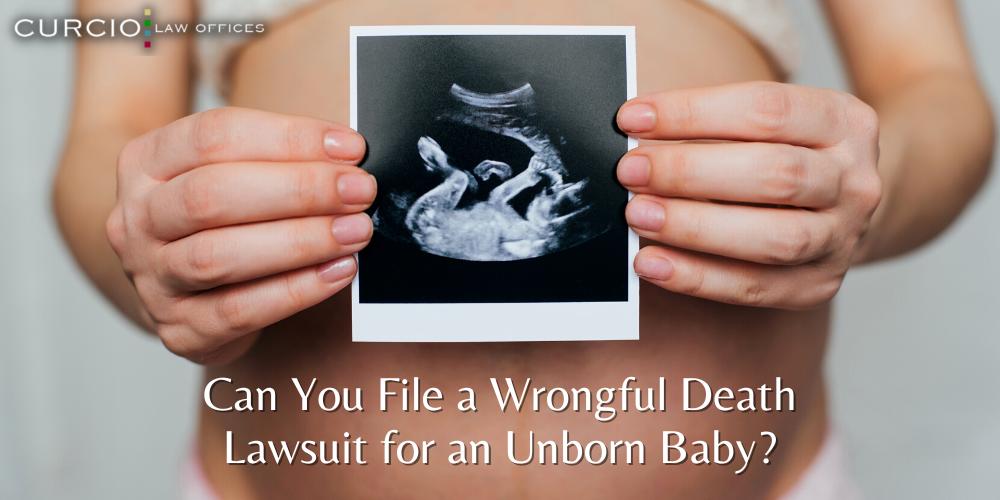Pregnancy, labor, and delivery are one of the most dangerous health emergencies that a woman can endure in her lifetime. Any number of accidents, assaults, or complications could result in a stillbirth or premature birth. Nowadays with the right medical care, babies born prematurely have high survival rates. But what if a pregnant woman endures a car accident or negligent medical care and her baby dies as a result? Would a woman have grounds to file a wrongful death lawsuit for an unborn baby? In many states, the answer lies in the specifics, such as fetal viability and whether or not negligence or violence contributed to the death. Below, we break down the specifics of this legal issue in the state of Illinois and across the United States.
If you or a loved one has died as a result of a wrongful, violent, or negligent act, you may have grounds to file a wrongful death claim in Illinois. Call our Chicago wrongful death lawyers at 312-321-1111 to schedule a free consultation today.
What is a Premature Birth?
Before we discuss whether or not you can file a wrongful death lawsuit for an unborn baby, it’s important to understand preterm birth, stillbirth, and fetal viability.
A premature birth – or a preterm birth – occurs when a baby is born alive before 37 weeks gestation, which is near the end of the third trimester. Extremely preterm babies are born before 28 weeks, very preterm babies are born between 28 to 32 weeks, and moderate to late preterm babies are born between 32 to 37 weeks gestation.
In 2021, about 1 in every 10 newborns were born preterm in the United States according to the CDC.
What is a Stillbirth?
A stillbirth occurs when a baby dies in the womb after the 20th week of pregnancy or when a baby dies during the labor and delivery process. Approximately 21,000 babies are stillborn in the U.S. every year according to the CDC.
What is the Age of Fetal Viability?
Across the world, there is no uniform gestational age that defines viability. In fact, medical organizations such as the Centers for Disease Control (CDC), the World Health Organization (WHO), and the American College of Obstetricians (ACOG) often have different answers about fetal viability. Instead, you must look at the specific fetal viability in individual countries.
The textbook definition of fetal viability is the ability of a fetus to survive outside the mother’s womb. Most medical professionals agree that a fetus is considered viable around 24 weeks gestational age.
However, fetal viability often varies across the world due to stage of development, fetal weight, and the biomedical and technological capacities in each country. For example, very premature babies (23 to 26 weeks gestation) born in low-income countries often do not survive due to poor medical care. Meanwhile, in a high-income country like the United States, the vast majority (78%) of babies born between 22 and 28 weeks gestation survive.
What is the Limit of Viability?
The limit of viability is the stage of fetal development in which a preterm baby has at least a 50% chance of long-term survival outside of the womb. Thanks to modern medicine and fetal intensive care units, the current limit of viability sits around 23 or 24 weeks gestation.
Some babies born before the limit of viability have been known to defy current odds of survival. In the United States, there is currently a world record for the lowest gestational age fetus to survive long-term outside of the womb. The world record belongs to Curtis Zy-Keith Means, born July 5, 2020, at 21 weeks and 1 day. He weighed 420 grams at birth, which is just under 1 pound.
Factors That Impact Fetal Survivability
The main factors that determine a preterm baby’s chances of survival are gestational age and weight. Generally, the lower the gestational age and weight, the higher risk the baby will not survive long-term. Other factors that impact fetal survival rates include:
- Fetal health problems such as infections, diseases, breathing problems, and congenital abnormalities.
- Maternal health problems such as diabetes and high blood pressure in the later stages of pregnancy.
- Premature rupture of fetal membranes (PROM) before 24 weeks of gestation can drastically reduce amniotic fluid and the overall fetal survival rate even if the baby is born much later.
- Whether or not a pregnant woman has access to a modern, clean, and high-tech medical facility that can provide life saving treatments during birth and postpartum.

What is Wrongful Death?
According to Illinois law, wrongful death occurs when someone dies as a result of someone else’s wrongful act or negligence. Most wrongful death claims are filed after some kind of fatal accident, such as:
- Motor vehicle accidents
- Construction accidents
- Slip and fall accidents
- Amusement park accidents
- Product liability violations
- Train accidents
- Aviation accidents
- Medical malpractice incidents
- Birth injuries
- Violent assaults
Can You File a Wrongful Death Lawsuit for an Unborn Baby?
Now back to the main question: can you file a wrongful death lawsuit for an unborn baby? The answer depends on specific state laws. Most states say yes, you can file a wrongful death action on behalf of an unborn child, as long as the fetus was considered viable at the time of its death, and as long as negligence played a large role in the death. Other states say that you can’t file a wrongful death claim for the unborn baby, but you may be able to file a different type of civil claim instead, such as a personal injury claim, to cover the damages that the parents suffered.
In Illinois specifically, the law states that pregnant women or parents of stillborn babies can file a wrongful death claim on behalf of the baby, regardless of “the state of gestation or development of a human being when an injury is caused, when an injury takes effect, or at death.” As long as the baby’s death was caused by some kind of wrongful or negligent act, you can file this type of civil lawsuit in the state of Illinois.
For example, let’s say a drunk driver gets into a car accident with a pregnant woman, and as a result, the woman suffers a miscarriage or a stillbirth due to her physical injuries. The woman was near the end of her second trimester at 27 weeks pregnant. In this case, she may have grounds to sue the drunk driver for the wrongful death of her unborn child.
Another example of the death of an unborn child that may warrant a wrongful death action in Illinois involves medical malpractice. Maybe a doctor fails to run the proper scans and tests to detect a life-threatening complication within the mother or the fetus. Or, maybe a doctor makes a mistake during the labor and delivery process and the baby suffers a fatal birth injury as a result. In these situations, parents of deceased unborn children may be able to file wrongful death claims to cover their damages.
When You Can’t File a Wrongful Death Lawsuit for a an Unborn Baby in Illinois
In the context of deceased babies – whether that be born or unborn – Illinois law specifies a couple of situations in which parents cannot file for wrongful death:
- A person cannot file a civil claim against a medical professional, a medical institution, or a pregnant woman if a fetus dies as a result of a legal and consensual abortion.
- A person cannot file a civil claim against a medical professional or a medical institution for the death of a fetus if the medical professional or medical institution didn’t know (and had no medical reason to know) that a woman was pregnant.
Proving Negligence
A crucial component of any wrongful death case is negligence. In order to recover a fair settlement for the wrongful death of a baby (born or unborn), you must prove the 4 elements of negligence.
- Duty of Care: Every person owes a duty of care to other people to act carefully, safely, and responsibly. For example, all drivers owe it to each other to drive safely, carefully, and soberly, while all doctors owe their patients the best possible medical care.
- Duty Dereliction: The at-fault party breached this duty of care by acting recklessly, dangerously, or carelessly.
- Direct Cause: A baby, whether born or unborn, died as a direct result of the at-fault party’s negligence.
- Damages: The parents suffered a wide variety of damages due to the death of their baby. Therefore, they should receive fair compensation.
Chicago wrongful death lawyers at Curcio & Casciato can help grieving parents prove these elements of negligence through medical records, witness statements, police reports, medical expert testimonies, surveillance video, etc.
Damages for the Death of an Unborn Baby
Chicago wrongful death lawyers at Curcio & Casciato can help grieving parents recover financial compensation for the following types of damages:
- All medical bills, including those for surgery, medications, physical therapy, etc.
- Lost wages
- Physical pain and suffering
- Emotional distress
- Mental health counseling costs
- Permanent loss of fertility
- Funeral and burial expenses of the baby
- Punitive damages (in some cases)
Wrongful Death Statute of Limitations in Illinois
In Illinois, the mother or father of a deceased newborn child has a certain window of time in which they can file a wrongful death claim.
The statute of limitations is two years from the day of the baby’s death. If the baby died as a result of violent intentional conduct (murder, homicide, or manslaughter), the statute of limitations is five years from the death date, thanks to Molly’s Law.
Lastly, parents of a deceased newborn can file a wrongful death claim one year after completed criminal prosecution if the defendant received one or more of the following convictions:
- Voluntary manslaughter or an intentional homicide of an unborn child.
- Reckless homicide or involuntary manslaughter of an unborn child.
- Drug-induced homicide.
- First or second degree murder.
The statute of limitations for wrongful death in Illinois can be complex and confusing, which is why it’s so important to speak with an experienced attorney if you believe you have a case. The team of experienced wrongful death attorneys at Curcio & Casciato can review the details of your case and help you determine if you still have time to sue.

Call Chicago Wrongful Death Lawyers at Curcio & Casciato Today
If your unborn child or newborn child suffered death as a direct result of someone’s negligence or violence, you may have grounds to file a wrongful death lawsuit in the state of Illinois. Our legal team understands the heartbreak and grief associated with any wrongful death case, but especially one in which a baby was the victim. We can help you fight for justice and a fair settlement while you focus on grieving with your family. Call a Chicago wrongful death lawyer at 312-321-1111 to schedule a free consultation today.



